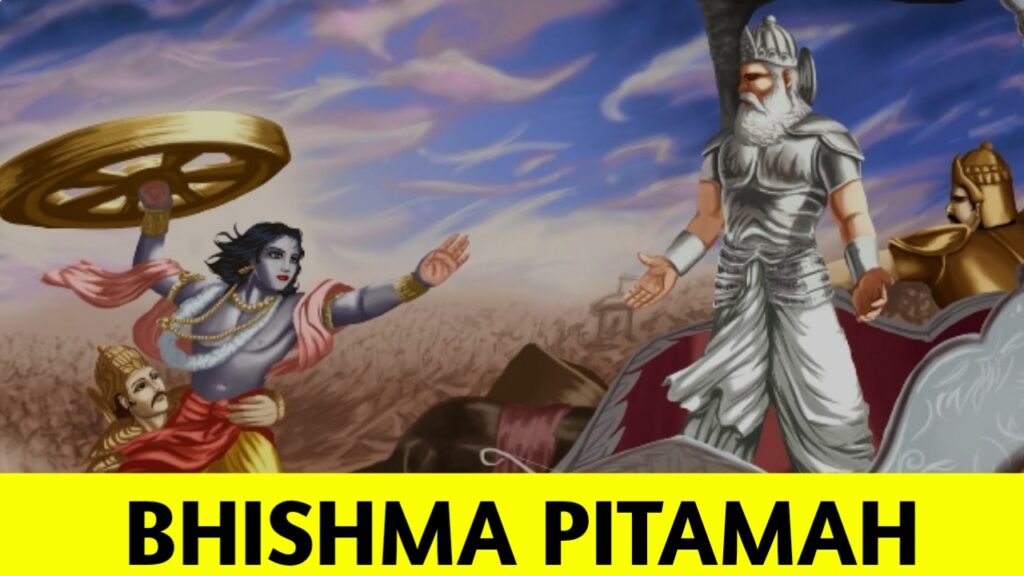Pitamah Bhishma – The Grand Sire of Mahabharata
By Sameer Naitra | Divine Duniya
Introduction to Pitamah Bhishma
Among the many legendary characters of the Indian epic Mahabharata, Pitamah Bhishma stands out as a symbol of duty, sacrifice, and wisdom. He was the son of King Shantanu and the river goddess Ganga, and was originally named Devavrata. Bhishma is often hailed as the grand patriarch of the Kuru dynasty and is deeply respected for his loyalty and unwavering commitment to dharma.
The Birth and Early Life of Bhishma
Bhishma was born to Ganga and Shantanu and was blessed with exceptional intelligence, strength, and divine knowledge. As a young prince, he was trained by the best gurus in the fields of warfare, scriptures, and statecraft. His life took a significant turn when his father, King Shantanu, wished to marry Satyavati. Her father demanded a promise that Satyavati’s children would inherit the throne, not Bhishma.
To fulfill his father’s desire, Devavrata took the famous Bhishma Pratigya—a terrible vow of lifelong celibacy and renunciation of the throne. This act earned him the name “Bhishma,” meaning one who undertakes a terrible vow. The gods blessed him with the boon of “Ichha Mrityu” – he could choose the time of his death.
Bhishma’s Role in the Kuru Dynasty
Despite renouncing the throne, Pitamah Bhishma remained a key figure in the Kuru kingdom. He served as the guardian and advisor to many kings, including Chitrangada, Vichitravirya, Dhritarashtra, Pandu, and later the Pandavas and Kauravas. His guidance ensured the political and military stability of the kingdom.
Bhishma also played a pivotal role in the grooming of future kings. He oversaw the education of the Kuru princes and ensured they upheld the principles of dharma and righteous conduct. However, his loyalty to the throne sometimes placed him in morally complex situations, especially during the events leading up to the Kurukshetra war.
Bhishma in the Mahabharata War
During the epic battle of Mahabharata, Bhishma sided with the Kauravas, not out of personal preference but due to his loyalty to the throne of Hastinapur. As the commander-in-chief of the Kaurava army for the first ten days, he caused great destruction on the battlefield.
However, his inner conflict was evident, as he never wished to fight against the Pandavas, whom he dearly loved. On the tenth day of the war, Bhishma was brought down by Arjuna using Shikhandi as a shield—someone Bhishma had vowed never to raise weapons against. Though mortally wounded by arrows, he did not die, invoking his boon of ichha mrityu, and lay on a bed of arrows awaiting an auspicious time to leave his body.
The Wisdom of Bhishma – Anusasana Parva
As he lay on the battlefield, Bhishma shared his wisdom with Yudhishthira and the Pandavas. This discourse, known as the Shanti Parva and Anusasana Parva, is one of the most profound sections of the Mahabharata, covering topics such as governance, ethics, philosophy, and dharma.
These teachings continue to inspire scholars and spiritual seekers even today. His insights into leadership, justice, and the responsibilities of a ruler remain relevant in contemporary governance and ethical discussions.
Legacy of Pitamah Bhishma
Pitamah Bhishma’s legacy lies in his unshakable commitment to duty and truth. He is remembered as the perfect example of a man who chose personal sacrifice for the greater good. His life teaches us that even the most difficult decisions can be made with grace and dignity when guided by righteousness.
Bhishma remains one of the most respected and revered characters in Indian mythology. His story is not just a tale of war, but a powerful lesson on dharma, leadership, and the consequences of choices made out of duty rather than desire.
Conclusion
The story of Pitamah Bhishma is a timeless tale of sacrifice, wisdom, and unwavering moral strength. He was more than a warrior—he was a philosopher, mentor, and the conscience of the Mahabharata. His character teaches us the importance of upholding values even in the face of adversity.
In today’s world, where principles are often compromised for personal gain, remembering Bhishma can inspire us to choose righteousness and integrity over convenience and self-interest.

